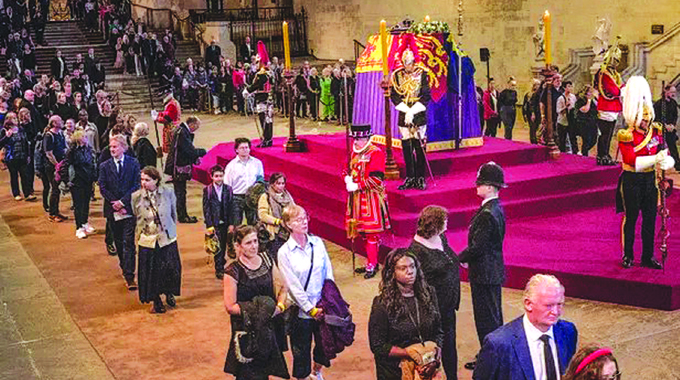Is it ethical to rejoice over someone’s death?

Dr Masimba Mavaza
Queen Elizabeth II’s death revived criticism of Britain’s legacy of colonialism and untold suffering of people in Africa.
Critics are responding to “the relationship of the monarchy to systems of oppression, repression and forced extraction of labour, and particularly African labour, and exploitation of natural resources and forcing systems of control in these places”.
The triggering point is that the Queen or any member of the Royal Family never offered an apology for all the evils done in Africa and Asia.
The death last week of Queen Elizabeth II prompted an outpouring of grief from millions across the world, it also revived criticism of her legacy, highlighting the complicated feelings of those who saw her as a symbol of the British colonial empire, an institution that enriched itself through violence, theft and oppression.
“If anyone expects me to express anything but disdain for the monarch who supervised a government that sponsored the genocide that massacred and displaced half my family and the consequences of which those alive today are still trying to overcome, you can keep wishing upon a star,” Uju Anya, an associate professor of second language acquisition at Carnegie Mellon University, tweeted.
Many accounts on Twitter went into overdrive.
It is said that one should show respect for the dead, but some would argue that it depends on who died and what they did in life.
As soon as news of Queen Elizabeth II’s death broke out, some social media users highlighted their indifference, others resorted to comedy and some pointed out the Queen’s connection to colonialism across the Caribbean and Africa.
In our society and indeed our humanity when someone is overtaken by death, it is common for the loved ones and enemies alike to ask for prayers.
Even if you wish that person dead, the wishes are never done publicly.
Following the death, a mourning period ensues with the goal of remembering the life of the dead and in a good amount of situations still wishing he or she were alive.
In this period, people are expected to be nice to the relatives of the deceased.
This is what made us human. It is called compassion. To those who are Christians the Bible is very clear on what is expected when one dies.
Mathew 5:4. clearly states: “Blessed are those who mourn, for they shall be comforted.”
We must always realise that loss hurts, and it’s something that each and every one of us will experience at some point in our lives.
Everything that lives must also die, and as the years roll along, it’s inevitable that we will lose those close to us, including friends, family members, animal companions, and mentors.
Although there isn’t any balm that can heal our pain completely, sending messages of sympathy and reassurance will help a great deal.
If someone you know has experienced the pain of loss recently, sharing one of the sympathy messages may lighten their spirits a little bit, and remind them that they are cared about by others.
The only thing which identify us as humans is when you say: “Wishing you peace and strength during this difficult time.”
We should remember that even if we offer our condolences, we cannot take away their pain, but we can listen and hope to touch one’s heart.
Unfortunately, we now see messages on Facebook, Whatsapp and Twitter which get us thinking about if it is morally rightly to celebrate a person’s death.
We have seen videos showing some people celebrating upon learning through their phones and word of mouth about the death of the British Queen.
We might not have a clear opinion on whether it is morally wrong or right to celebrate the death of a person we think wronged us.
Queen Elizabeth II’s death aged 96 has sparked a flood of tributes and fond words for the queen who reigned for a record-breaking 70 years.
From world leaders to members of the public, the social media landscape has been filled with expressions of both sadness and sarcasm since it was announced that the sovereign had died at Scotland’s Balmoral Castle.
Some Twitter users have taken the opportunity to mark the Queen’s death as something of a moment to celebrate, with a range of memes and explanatory threads filling the timeline.
Those who find no words of comfort in this dark time argue that the British Empire at the height of its power was described as the empire on which the sun never set” and commanded 23 percent of the world’s population in 1913.
It controlled countries across every continent and today 14 overseas territories remain under British sovereignty.
“Black Twitter is absolutely Black Twittering right now,” said The Atlantic contributing writer Jemele Hill, who defended people questioning the queen’s legacy. It was during the Queen’s time that a lot of despicable things were done on Africans.”
Another journalist, Hill, defended the outpouring of hate saying: “Journalists are tasked with putting legacies into full context, so it is entirely appropriate to examine the queen and her role in the devastating impact of continued colonialism.”
To illustrate her point, Hill shared a link to an op-ed for The New York Times, in which Harvard professor Maya Jasanoff wrote in a guest essay: “We should not romanticize her era. The queen helped obscure a bloody history of decolonization whose proportions and legacies have yet to be adequately acknowledged.
“This is what I mean by considering the full history of the Queen. It’s ok to pose questions and think about the fullness of legacies.”
Ebony Elizabeth Thomas, an associate professor at the University of Michigan’s School of Education, spoke out against a pushback towards those who were questioning Queen Elizabeth’s II’s legacy.
“Telling the colonized how they should feel about their colonizer’s health and wellness is like telling my people that we ought to worship the Confederacy,” she tweeted.
“Respect the dead’ when we’re all writing these Tweets in English. How’d that happen, hm? We just chose this language?”
The British people have lost a mother and a leader.
I think mourning or celebrating a person comes down to several factors. One of them is how you value a life. If you think that all lives are equal, then perhaps you may think it is wrong to celebrate anyone’s death.
Another factor is obviously your relationship to the person.
When someone dies they have no knowledge or wisdom because they are dead.
Jesus Christ performed resurrections during his brief ministry of three and a half years; one of those was the resurrection of his friend Lazarus.
“Lazarus our friend has fallen asleep, but I am traveling there to awaken him,” he said. The disciples then said to him: “Lord, if he is sleeping, he will get well.” Jesus, however, had spoken about his death. But they imagined he was speaking about taking rest in sleep. Then Jesus said to them plainly: “Lazarus has died” (John 11:11–14).
It is interesting that Jesus likened death to sleeping. When in a deep sleep you are unaware of the passing of time.
Someone who has been dead for a thousand years and then was resurrected they would not be aware that a thousand years had passed.
Lazarus could not have known he had been dead for four days.
Those Christians who celebrate the death of others must remember God’s words – “Behold, all souls are mine; as the soul of the father, so also the soul of the son is mine: the soul that sinneth, it shall die”. (Ezekiel 18:4).
You might have wondered the reason for drawing parallels between the Biblical doctrine to the debacle in the world today after the demise of the Queen.
Every death naturally is cause for grief to the families and the community.
This is not the only death that revealed people rejoicing. Adolf Hitler, Saddam Hussein, Pol Pot, Qassem Suleimani etc died and some people celebrated.
In all this, an ethical question arises: should any one rejoice in the death of an enemy?









Comments